Rolling Stone is an American magazine focusing on popular culture.
Contents
Rolling Stone or Rolling Stones may also refer to:
Rolling Stone is an American magazine focusing on popular culture.
Rolling Stone or Rolling Stones may also refer to:

The Rolling Stones are an English rock band formed in London in 1962. Active across seven decades, they are one of the most popular and enduring bands of the rock era. In the early 1960s, the band pioneered the gritty, rhythmically driven sound that came to define hard rock. Their first stable line-up consisted of vocalist Mick Jagger, guitarist Keith Richards, multi-instrumentalist Brian Jones, bassist Bill Wyman, and drummer Charlie Watts. During their early years, Jones was the primary leader of the band. After Andrew Loog Oldham became the group's manager in 1963, he encouraged them to write their own songs. The Jagger–Richards partnership became the band's primary songwriting and creative force.
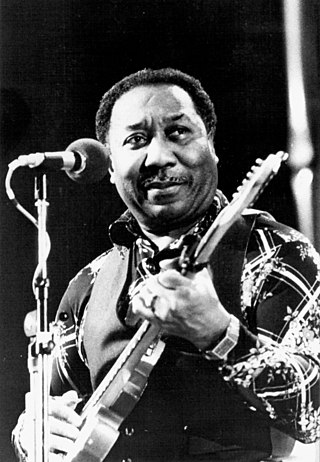
McKinley Morganfield, known professionally as Muddy Waters, was an American blues singer and musician who was an important figure in the post-World War II blues scene, and is often cited as the "father of modern Chicago blues". His style of playing has been described as "raining down Delta beatitude".

Exile on Main St. is the tenth studio album by the English rock band the Rolling Stones, released on 12 May 1972 by Rolling Stones Records. The 10th released in the UK and 12th in the US, it is viewed as a culmination of a string of the band's most critically successful albums, following Beggars Banquet (1968), Let It Bleed (1969) and Sticky Fingers (1971). Exile on Main St. is known for its murky, inconsistent sound due to more disjointed musicianship and production, along with a party-like atmosphere heard in several tracks.
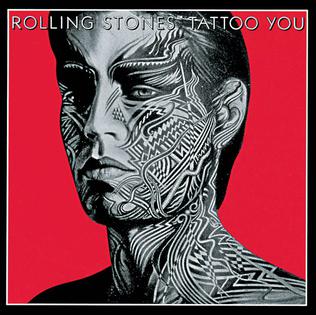
Tattoo You is the sixteenth studio album by the English rock band the Rolling Stones, released on 24 August 1981 by Rolling Stones Records. The album is mostly composed of studio outtakes recorded during the 1970s, and contains one of the band's most well-known songs, "Start Me Up", which hit number two on the US Billboard singles charts.

Sticky Fingers is the ninth studio album by the English rock band the Rolling Stones. It was released on 23 April 1971 on the Rolling Stones' new label, Rolling Stones Records. The Rolling Stones had been contracted by Decca Records and London Records in the UK and the US since 1963. On this album, Mick Taylor made his second full-length appearance on a Rolling Stones album. It was the first studio album without Brian Jones, who died two years earlier. The original cover artwork, conceived by Andy Warhol and photographed and designed by members of his art collective, the Factory, showed a picture of a man in tight jeans, and had a working zip that opened to reveal underwear fabric. The cover was expensive to produce and damaged the vinyl record, so the size of the zipper adjustment was made by John Kosh at ABKCO records. Later re-issues featured just the outer photograph of the jeans.
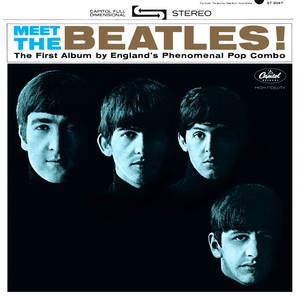
Meet the Beatles! is a studio album by the English rock band the Beatles, released as their second album in the United States. It was the group's first American album to be issued by Capitol Records, on 20 January 1964 in both mono and stereo formats. It topped the popular album chart on 15 February 1964 and remained at number one for eleven weeks before being replaced by The Beatles' Second Album. The cover featured Robert Freeman's iconic portrait of the Beatles used in the United Kingdom for With the Beatles, with a blue tint added to the original stark black-and-white photograph.

The Rolling Stones, Now! is the third American studio album by English rock band The Rolling Stones, released in March 1965 by their initial American distributor, London Records. Although it contains two previously unissued songs and an alternative version, the album mostly consists of songs released earlier in the United Kingdom, as well as the group's recent single in the United States, "Heart of Stone" backed with "What a Shame". Mick Jagger and Keith Richards wrote four of the songs on the album, with the balance composed by American rhythm and blues and rock and roll artists.
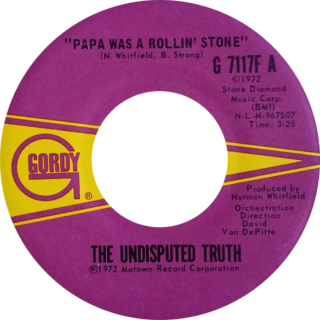
"Papa Was a Rollin' Stone" is a song originally performed by Motown recording act the Undisputed Truth in 1972, though it became much better known after a Grammy-award winning cover by the Temptations was issued later the same year. This latter version of the song became a number-one hit on the Billboard Hot 100.
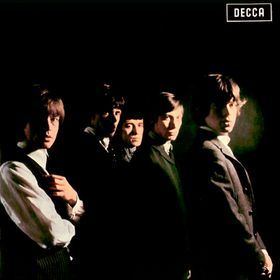
The Rolling Stones is the debut studio album by the English rock band the Rolling Stones, released by Decca Records in the UK on 17 April 1964. The American edition of the LP, with a slightly different track list, came out on London Records on 29 May 1964, subtitled England's Newest Hit Makers, which later became its official title.
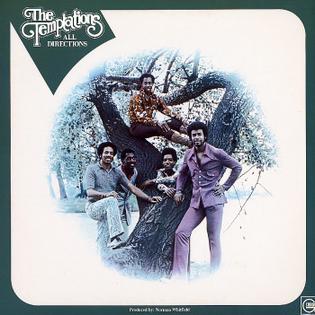
All Directions is a 1972 album by The Temptations for the Gordy (Motown) label, produced by Norman Whitfield. It reached number two on the Billboard 200, making it the band's most successful non-collaborative album on the chart, and became their twelfth album to reach number one on the Top R&B Albums chart.

Hot Rocks 1964–1971 is a compilation album by the Rolling Stones released by London Records in December 1971. It became the Rolling Stones' best-selling release of their career and an enduring and popular retrospective. The album includes a mixture of hit singles, such as "Jumping Jack Flash", B-sides such as "Play with Fire", and album tracks such as "Under My Thumb" and "Gimme Shelter", the last of which has become one of the Rolling Stones' most popular and highly regarded songs. The album artwork depicts five nested silhouettes of the band members' profiles taken by rock photographer Ron Raffaelli in 1969. A photograph of the band at Swarkestone Hall Pavilion, taken by Michael Joseph in 1968, was printed on the back cover of the vinyl release.
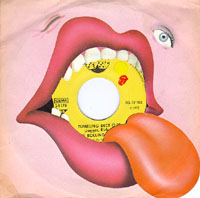
"Tumbling Dice" is a song by the English rock band the Rolling Stones. It was released worldwide as the lead single from the band's 1972 double album Exile on Main St. on 14 April 1972 by Rolling Stones Records. A product of Mick Jagger and Keith Richards' songwriting partnership, the song contains a blues and boogie-woogie-influenced rhythm that scholars and musicians have noted for its unusual tempo and groove. The lyrics are about a gambler who cannot remain faithful to any woman.
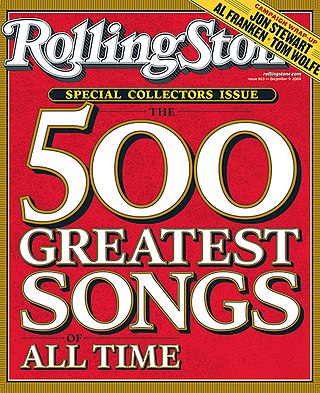
"The 500 Greatest Songs of All Time" is a recurring song ranking compiled by the American magazine Rolling Stone. It is based on weighted votes from selected musicians, critics, and industry figures. The first list was published in December 2004 in a special issue of the magazine, issue number 963, a year after the magazine published its list of "The 500 Greatest Albums of All Time". In 2010, Rolling Stone published a revised edition, drawing on the original and a later survey of songs released up until the early 2000s.

Folk Singer is the second studio album and fourth album overall by Muddy Waters, released in January 1964 by Chess Records. The album features Waters on acoustic guitar, backed by Willie Dixon on string bass, Clifton James on drums, and Buddy Guy on acoustic guitar. It is Waters's only all-acoustic album. Numerous reissues of Folk Singer include bonus tracks from two subsequent sessions, in April 1964 and October 1964.
"Gimme Shelter" is a song by the English rock band the Rolling Stones. Written by Jagger–Richards, it is the opening track of the band's 1969 album Let It Bleed. The song covers the brutal realities of war, including murder, rape and fear. It features prominent guest vocals by American singer Merry Clayton.
A milestone is a marker of distance along roads.

"Waiting on a Friend" is a song by the English rock band the Rolling Stones from their 1981 album Tattoo You. Written by Mick Jagger and Keith Richards and released as the album's second single, it reached No. 13 on the Billboard Hot 100 singles chart in the US.

"Rollin' Stone" is a blues song recorded by Muddy Waters in 1950. It is his interpretation of "Catfish Blues", a Delta blues that dates back to 1920s Mississippi. "Still a Fool", recorded by Muddy Waters a year later using the same arrangement and melody, reached number nine on the Billboard R&B chart. "Rollin' Stone" has been recorded by a variety of artists.
What's New may refer to:

1972 is a studio EP by American rock band the Black Crowes, released on May 4, 2022. It is an album of cover songs.